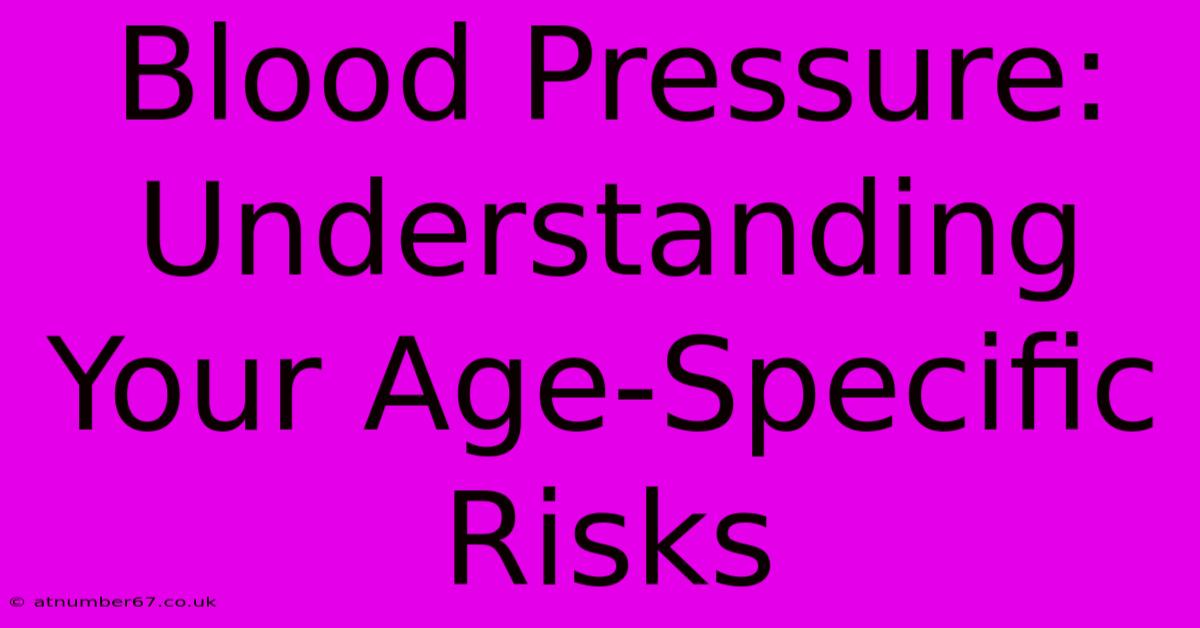Blood Pressure: Understanding Your Age-Specific Risks

Table of Contents
Blood Pressure: Understanding Your Age-Specific Risks
Maintaining healthy blood pressure is crucial for overall well-being, but the risks and recommended actions change throughout life. Understanding your age-specific risks is key to proactive health management. This comprehensive guide breaks down blood pressure concerns and strategies across different age groups.
Blood Pressure Basics: A Quick Refresher
Before delving into age-specific risks, let's quickly review what blood pressure is and why it matters. Blood pressure measures the force of your blood against your artery walls. It's expressed as two numbers: systolic (the top number) and diastolic (the bottom number). High blood pressure, or hypertension, increases your risk of serious health problems like heart disease, stroke, and kidney failure.
Ideal blood pressure is generally considered to be less than 120/80 mmHg. However, individual targets might vary based on age, health conditions, and other factors. Always consult with your doctor to determine your personal blood pressure goals.
Blood Pressure Risks: Across the Lifespan
Childhood and Adolescence (0-18 years):
While high blood pressure is less common in children and teens, it's still a significant concern. Early detection is crucial for preventing long-term health complications.
- Risk Factors: Obesity, family history of hypertension, unhealthy diet high in sodium and saturated fats, lack of physical activity.
- Prevention: Encourage healthy eating habits, regular exercise, and maintaining a healthy weight. Early detection through regular check-ups is vital.
Young Adulthood (19-40 years):
Young adults often face increased stress levels, unhealthy lifestyle choices, and a lack of awareness about blood pressure management.
- Risk Factors: Stress, poor diet, lack of exercise, excessive alcohol consumption, smoking, family history of hypertension.
- Prevention: Prioritize stress management techniques, adopt a healthy diet rich in fruits, vegetables, and whole grains, engage in regular physical activity, limit alcohol intake, and avoid smoking. Regular blood pressure checks are recommended.
Middle Age (41-60 years):
This age group experiences a significant increase in hypertension risk due to accumulating lifestyle factors and physiological changes.
- Risk Factors: Obesity, diabetes, high cholesterol, family history of hypertension, sedentary lifestyle, smoking, excessive alcohol consumption, stress.
- Prevention: Focus on weight management, dietary changes, regular exercise, stress reduction techniques, and blood pressure monitoring. Regular medical check-ups are critical. This age bracket should be particularly vigilant in managing risk factors.
Older Adults (61+ years):
Blood pressure often increases with age, making it essential for seniors to monitor their blood pressure closely.
- Risk Factors: Age-related physiological changes, existing health conditions (heart disease, diabetes, kidney disease), medications, and decreased physical activity.
- Prevention: Regular blood pressure checks are paramount. Maintaining a healthy diet, engaging in age-appropriate exercise, managing existing health conditions, and adhering to medication regimens are crucial. Regular communication with healthcare providers is vital for adapting treatment plans as needed.
Managing Your Blood Pressure: Key Strategies
Regardless of your age, managing your blood pressure involves a holistic approach:
- Dietary Changes: Reduce sodium intake, increase potassium-rich foods (fruits, vegetables), choose lean protein sources, and limit saturated and trans fats. The DASH diet (Dietary Approaches to Stop Hypertension) is often recommended.
- Regular Exercise: Aim for at least 150 minutes of moderate-intensity aerobic activity per week.
- Stress Management: Practice relaxation techniques such as yoga, meditation, or deep breathing exercises.
- Weight Management: Maintaining a healthy weight reduces strain on the cardiovascular system.
- Medication: If lifestyle changes aren't enough to control blood pressure, your doctor may prescribe medication.
- Regular Check-ups: Schedule regular appointments with your doctor for blood pressure monitoring and overall health assessment.
Conclusion: Proactive Health is Key
Understanding your age-specific risks for high blood pressure empowers you to take proactive steps towards maintaining optimal cardiovascular health. By adopting healthy lifestyle habits and seeking regular medical care, you can significantly reduce your risk of developing hypertension and its associated complications. Remember, consistent monitoring and a proactive approach are essential for a long and healthy life.

Thank you for visiting our website wich cover about Blood Pressure: Understanding Your Age-Specific Risks. We hope the information provided has been useful to you. Feel free to contact us if you have any questions or need further assistance. See you next time and dont miss to bookmark.
Featured Posts
-
Kaka Son The Kaka Son Method
Apr 14, 2025
-
Bam Margeras Net Worth The Truth Behind The Rumors
Apr 14, 2025
-
Maxine Waters Legacy At Risk Financial Scandal
Apr 14, 2025
-
Richard Tice Net Worth And Business Empire
Apr 14, 2025
-
Jimmy Johnsons Net Worth More Than You Imagined
Apr 14, 2025
